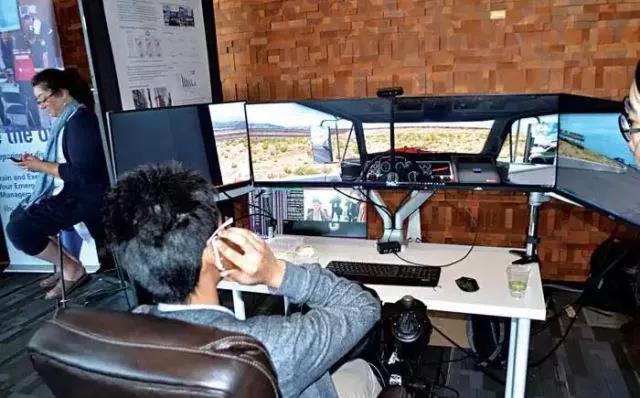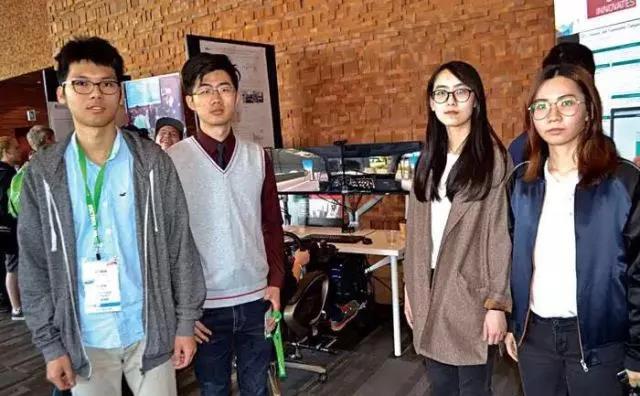ZJU-SFU dual degree students stage innovation at #BCTECH Summit 2018
A driving warning simulation system jointly developed by four graduates of the ZJU-SFU dual degree program was on display at the #BCTECH Summit 2018 with other major technological advancements around the world.
Aimed at preventing car accidents, the system is able to give timely warnings to drivers. When the driver is making a turn, for example, the system monitors the rotation of the eyes. A leftward eye movement indicates an intention to turn left, and the system could remind the driver of potential dangers.

LU Yuhe is demonstrating the driving warning simulation system. If the driver uses his/her phone while driving, the system will issue an alert. (photo by FENG Ruixiong)
The #BCTECH Summit is the largest technology conference in Western Canada, offering an overview of major technological advancements of British Columbia, Canada. The team took about a year to develop this system, which is beginning to take shape.
As a featured cooperation project between Zhejiang University (ZJU) and Simon Fraser University of Canada (SFU), the “2+2” Dual Degree Program (DDP) gives admissions to 30 students from China and Canada each year. Chinese students are selected from freshmen of ZJU. Participants of the program will spend their first two years in China, and the following two years in Canada. Students who meet the graduation requirements will obtain bachelor degrees from both universities.

LU Yuhe, SONG Danyang, WU Yue and HE Yiting and their system. (photo by FENG Ruixiong)
HE Yiting, a graduate of Zhejiang Zhenhai High School, was admitted to the Qizhen Class of ZJU’s Chu Kochen Honors College in 2012. She was admitted to the dual degree program in 2015 and successfully completed the program this year.
At this year’s #BCTECH Summit in Vancouver, her outstanding performance won high praise from experts on site. As one of the DDP students, HE's story could lead us to the most authentic experience of this program.
Q: I heard that your project has got a lot of attention after the summit, what do you think is the most charming thing about the project?
A: The project that we presented at the #BCTECH Summit 2018 is a supporting system for safe driving. It is in fact an application of the edge computing platform developed by our laboratory. Edge computing, to put it simply, is the deployment of computing units close to terminals. Compared with cloud computing platforms, edge computing can provide greater real-time performance and stability. The system can predict driving behaviors by eye-tracking, and give early warnings for dangerous behaviours such as using a cell phone, smoking and ignoring traffic signs. After the exhibition at the summit, we received a cooperation request from Translink Transport Line, a transportation service agency in British Columbia, Canada.
Q: I know that teachers and students in the research team are from many different countries. How do you collaborate in this intercultural environment?
A: We have actually grown used to intercultural cooperation through our study experience in DDP. Prof. LIU Jiangchuan (IEEE Fellow), our advisor, also helped us tremendously in our research, study and life.
Both my classmates and I are all passionate about computer networks research, and we all feel excited to be able to translate the most advanced theoretical research into an actual system. I benefited a lot from the cooperation with my team members.
Q: Can you tell me what you gained from DDP?
A: DDP has brought me into contact with two campuses and two cultures. The ZJU and SFU campuses are both beautiful, providing a wonderful environment for research. Additionally, the program offers assistance in creating an effective résumé and succeeding in the interview to students who apply for co-op jobs for the first time. There are many fellow students getting co-op experience in prestigious companies like SAP, Microsoft and Amazon through the program. The co-op experience is actually very helpful for job hunting after graduation.
In terms of scientific research, SFU is a very dynamic place with strong research atmosphere. There are many world-famous professors of computer science, such as our advisor Prof. LIU Jiangchuan, Greg Mori, Jian Pei and Martin Ester, and other well-known professors in related fields. Since our program has already established a good reputation, many SFU professors are happy to invite DDP students to join their projects. Many DDP students are even able to publish papers in top international conferences during their undergraduate years.
Q: What were some of the most impressive experiences you had during your study in Vancouver?
A: Vancouver is a beautiful coastal city that brings together food from all over the world. Compared with other cities in North America, it is especially multicultural. The inclusive and international community of SFU creates ample opportunities for intercultural communications. Vancouver also has a pleasant climate and fresh air, making it extremely suitable for outdoor activities. Many DDP students participated in marathons there. The school also organizes regular group activities like scholar visits, kayaking and hiking. There are plenty of interactions among DDP students, who often help each other in their studies and job applications. I feel warm being part of such a connected group.
Q: What is your plan for future research or career?
A: We will continue research in the field of edge computing. At the moment, edge computing is an emerging field. It would be very meaningful to apply this technology to people’s daily life and makea positive influence on the society. We plan to participate in the Hangzhou Entrepreneurship Competition in 2018, hoping to further promote the application of edge computing.
Image Credit: Sing Tao Daily
Source: College of Computer Science and Technology